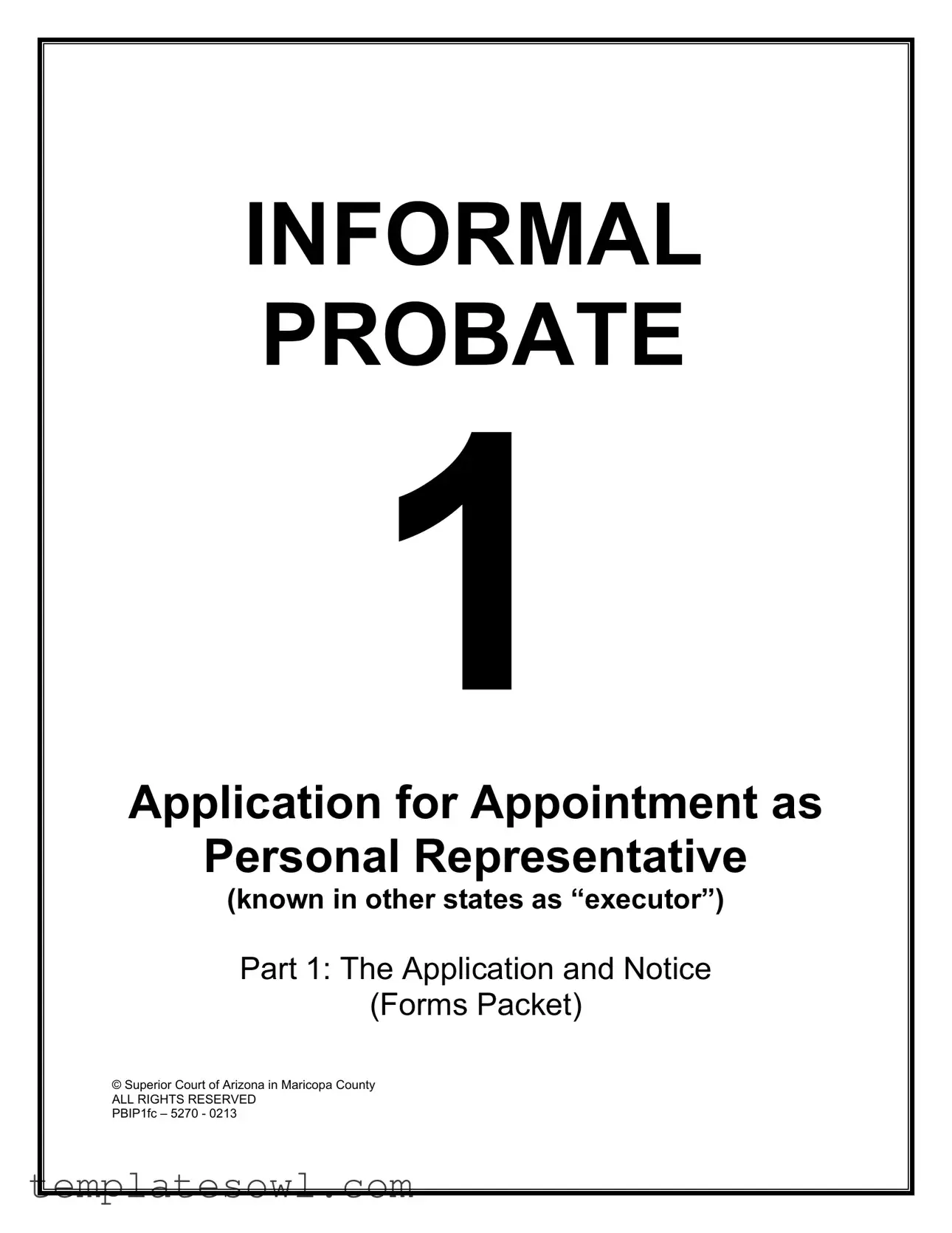Fill Out Your Informal Probate Form
Navigating the loss of a loved one can be an emotional and overwhelming experience, but understanding the informal probate process can help ease some of that burden. The Informal Probate form serves as a vital tool for individuals who are stepping into the role of Personal Representative following a person's passing. This form package guides you through the application and notice requirements, ensuring that you fulfill your responsibilities in managing the deceased’s estate. If you have an interest in the estate, whether because you are related to the deceased or have legal ties to their property, this process may be relevant to you. The form allows for the appointment of a Personal Representative even in the absence of a will, provided certain conditions are met. Specifically, you must hold the original will if one exists, and the individual must have died more than 120 hours, but less than two years ago. To successfully navigate the probate process, it is recommended that you familiarize yourself with the various documents included in the form packet, such as the Probate Cover Sheet, Waivers, and the Application itself. Each document plays a crucial role in providing clarity and verify your authority to act on behalf of the deceased. The path may seem daunting, but with the right information and preparation, you can move forward with confidence and compassion during such a challenging time.
Informal Probate Example

INFORMAL
PROBATE
Application for Appointment as
Personal Representative
(known in other states as “executor”)
Part 1: The Application and Notice
(Forms Packet)
©Superior Court of Arizona in Maricopa County
ALL RIGHTS RESERVED PBIP1fc – 5270 - 0213

INFORMAL PROBATE
APPOINTMENT OF PERSONAL REPRESENTATIVE
AND ADMISSION OF WILL (if applicable)
CHECKLIST
You may use the forms and instructions in this packet only if the following factors apply to your situation:
You are related to a person who died or you have a legal interest in the person’s property.
The person had a will or did not have a will.
If the person did have a will, you have the original will, AND
The person died more than 120 hours ago, but less than 2 years ago.*
You want to file court papers to be appointed the Personal Representative of the
*There are certain limited exceptions to the
READ ME: Consulting a lawyer before filing documents with the court may help prevent unexpected results. A list of lawyers you may hire to advise you on handling your own case or to perform specific tasks, as well as a list of
©Superior Court of Arizona in Maricopa County
ALL RIGHTS RESERVED
Page 1 of 1

INFORMAL PROBATE
APPLICATION FOR APPOINTMENT AS PERSONAL REPRESENTATIVE
PART 1: The Application and Notice
This packet contains court forms to file and give notice of an Application for Appointment as Personal Representative, whether there was a Will or not. The documents should appear in the following order:
Order |
File Number |
Title |
# pages |
|
|
|
|
1 |
PBIP1k |
Checklist for using this packet |
1 |
|
|
|
|
2 |
PBIP1ft |
Index (this page) |
1 |
|
|
|
|
3 |
PB10f |
“Probate Cover Sheet” |
2 |
|
|
|
|
|
|
“Declaration of Completion of Training” * |
|
4 |
PBT10f |
*See Instructions packet. View training material before you |
1 |
|
|
file to avoid delays. |
|
5 |
PBIP11f |
“Waiver of Right to Appointment and Consent” |
1 |
|
|
|
|
6 |
PBIP12f |
“Waiver of Bond” |
1 |
|
|
|
|
7 |
PBIP13f |
“Application for Appointment” |
3 |
|
|
|
|
8 |
PBIP14f |
“Notice of Application” |
1 |
|
|
|
|
9 |
PBIP15f |
“Proof of Mailing Notice of Application” |
1 |
|
|
|
|
10 |
PB25f |
“Declaration Supporting Publication” |
2 |
|
|
|
|
11 |
PBIP16f |
“Statement of Informal Appointment” |
1 |
|
|
|
|
12 |
PBIP17f |
“Letters of Appointment and Acceptance of |
1 |
|
|
Appointment” |
|
|
|
|
|
13 |
PBIP18f |
“Order to Personal Representative and Acknowledgment |
5 |
|
|
and Information to Heirs/Devisees” |
|
|
|
|
|
The documents you have received are copyrighted by the Superior Court of Arizona in Maricopa County. You have permission to use them for any lawful purpose. These forms shall not be used to engage in the unauthorized practice of law. The Court assumes no responsibility and accepts no liability for actions taken by users of these documents, including reliance on their contents. The documents are under continual revision and are current only for the day they were received. It is strongly recommended that you verify on a regular basis that you have the most current documents. 
© Superior Court of Arizona in Maricopa County |
Page 1 of 1 |
|
ALL RIGHTS RESERVED |
|
|

SUPERIOR COURT OF ARIZONA
IN MARICOPA COUNTY
PROBATE INFORMATION COVER SHEET
Case Number: PB
FOR CLERK’S USE ONLY
A person needing a guardian or conservator is the “ward”. A person who died is the “decedent”.
INFORMATION ABOUT THE WARD or THE DECEDENT
NAME: |
|
DATE OF BIRTH: |
|
||||
MAILING ADDRESS : |
|
|
|
|
|||
STREET ADDRESS (if different): |
|
|
|
|
|||
TELEPHONE (Home): |
|
|
SSN: |
|
|||
TELEPHONE (Cellular): |
|
|
EMAIL: |
|
|||
ADDITIONAL WARDS ARE INVOLVED. Information listed separately. |
|||||||
INFORMATION ABOUT THE PETITIONER, the person filing these papers.
NAME:
MAILING ADDRESS:
TELEPHONE: |
|
|
EMAIL: |
|
|
INFORMATION ABOUT PETITIONER’S ATTORNEY: |
Petitioner is not represented by an attorney, or |
||||
NAME: |
|
|
BAR # |
|
|
TELEPHONE: |
|
EMAIL: |
|||
An INTERPRETER IS NEEDED for this language: |
|
|
|
|
|
By |
||
(List Names of) Persons who need interpreter: |
Name: |
|
|
|
|
|||
Name: |
|
|
Name: |
|
|
|
|
|
|
|
|
|
|
||||
|
STAFF USE ONLY: REASON FEES NOT PAID: |
Government Charge |
Deferred |
|
|
|||
NATURE OF ACTION: Place an "X" next to number which describes the nature of the case. Check only ONE.
200 ESTATE
____ 201 Formal Appointment of Personal
Representative
____ 202 Informal Appointment of Personal
Representative
____ 203 Ancillary Administration
____ 204 Affidavit of Succession to Realty
____ 205 Trust Administration
____ 206 Formal Probate of Will
____ 207 Informal Probate of Will
____ 208 Proof of Authority
____ 210 Other
Specify
____ 211 Single Transaction/Limited Conservatorship
____ 212 Foreign Domicilliary
220CONSERVATOR
____ 221 Minor
____ 222 Adult Incapacitated Person
230GUARDIANSHIP
____ 231 Minor
____ 232 Adult Protected Person
(including Dementia and Alzheimer’s)
____ 233 Adult Incapacitated Person (Mental Health Powers)*
*(Only if needs inpatient behavioral or mental health treatment)
240
____ 241 Minor
____ 242 Adult Protected Incapacitated Person
(including Dementia and Alzheimer’s)
____ 243 Adult Protected Incapacitated Person (Mental Health Powers)*
*(Only if needs inpatient behavioral or mental health treatment)
© Superior Court of Arizona in Maricopa County |
Page 1 of 2 |
|
ALL RIGHTS RESERVED |
|
|
|
|

|
|
|
|
|
|
|
Case No. |
|
|
|||
INFORMATION ABOUT THE FIDUCIARY, |
the person to serve as guardian, conservator, or |
|||||||||||
personal representative (executor) of the Estate of someone who died. |
||||||||||||
|
|
|
|
|||||||||
NAME: |
|
|
|
DATE OF BIRTH: |
|
|||||||
MAILING ADDRESS: |
|
|
|
|
|
|
|
|
|
|||
STREET ADDRESS: (if different) |
|
|
|
|
|
|
|
|
|
|||
TELEPHONE (Home): |
|
|
SSN: |
|
||||||||
TELEPHONE (Cellular): |
|
|
EMAIL: |
|
||||||||
TELEPHONE (Work): |
|
CERTIFICATION # |
||||||||||
|
|
|
|
|
|
|
|
(for |
||||
RELATIONSHIP TO THE WARD OR (if an estate matter) THE DECEDENT:
PHYSICAL DESCRIPTION: |
RACE: |
|
HEIGHT |
|
WEIGHT: |
|
EYE COLOR: |
|
|
HAIR COLOR: |
|
|
|
|
|
|
|
|
By signing below, I state to the Court under penalty of perjury that the contents of this document are true and correct to the best of my knowledge and belief.
Petitioner or Attorney Signature
NOTICE
SUBMIT THIS FORM WITH NEW CASES ONLY.
If there is already a (Maricopa County) Probate Court case number and you are filing in an existing
Superior Court case in Maricopa County, DO NOT SUBMIT THIS FORM.
© Superior Court of Arizona in Maricopa County |
Page 2 of 2 |
|
ALL RIGHTS RESERVED |
|
|
|
|

Your Name:
Your Address:
Your City, Zip Code:
Your Telephone No.
Represents 
 Self OR
Self OR 
 Attorney for:
Attorney for:
State Bar Number (if applicable):
FOR CLERK’S USE ONLY
SUPERIOR COURT OF ARIZONA
IN MARICOPA COUNTY
In the Matter of the Estate of |
Case Number PB: |
A
Deceased or
|
DECLARATION OF COMPLETION |
|
OF TRAINING for |
Protected Person |
Rule 27.1 of the Arizona Rules of Probate Procedure requires that a person to be appointed guardian, conservator, or personal representative of an estate, who is neither a
UNDER PENALTY OF PERJURY
I state to the Court that in accord with Rule 27.1 of the Arizona Rules of Probate Procedure, I have completed the required training for
Unlicensed Fiduciary |
Date completed: |
Conservatorship |
Date completed: |
Personal Representative |
Date completed: |
Guardianship |
Date completed: |
Date:
Signature
Printed Name
INSTRUCTIONS: Fill out this Declaration completely and provide accurate information. Make at least one copy. You will need to file the original with the Clerk of Court and provide a copy to the Probate Registrar before receiving any permanent letters of appointment.
Superior Court of Arizona in Maricopa County
ALL RIGHTS RESERVED
Page 1 of 1 |
AFF

Name of Person Filing Document:
Your Address:
Your City, State, Zip Code:
Your Telephone Number:
Representing 
 Self (Without a lawyer) or
Self (Without a lawyer) or 
 Attorney for
Attorney for
SUPERIOR COURT OF ARIZONA
MARICOPA COUNTY
In the Matter of the Estate of
Case Number:
FOR CLERK’S USE ONLY
an Adult
a Minor, deceased
WAIVER OF RIGHT TO APPOINTMENT AS PERSONAL REPRESENTATIVE AND CONSENT TO APPOINTMENT OF PERSONAL REPRESENTATIVE
THE UNDERSIGNED PERSON STATES AS FOLLOWS:
1. I am: (check one box)
(Check only if there is NO Will) an heir of the decedent's estate without a Will or (Check only if there IS a Will) a person named in the decedent's Will.
2.I have priority for appointment as Personal Representative of this estate under A.R.S.
(Check only if there IS a Will) I am named as Personal Representative in the Will of the person who died;
(Check only if there IS a Will) I am the surviving spouse of the person who died and I am named in the Will;
(Check only if there IS a Will) I am another person named in the Will of the person who died; I am the surviving spouse of the person who died;
I am another person entitled to inherit the property of the person who died because (explain)
3.I waive and want to give up any right I have to appointment as the Personal Representative of this estate.
4. |
I consent to the appointment of (name) |
|
|
|
as |
|||
|
Personal Representative of the estate. |
|
|
|
|
|
||
|
|
|
|
|
Signature |
|
|
|
STATE OF ARIZONA |
) |
|
|
|
|
|
|
|
MARICOPA COUNTY |
)ss. |
|
|
|
|
|
||
Subscribed and sworn to before me this date: |
|
|
by |
|
|
. |
||
My Commission Expires:
Deputy Clerk/Notary
© Superior Court of Arizona in Maricopa County |
|
PBIP11f |
June 21, 2007 |
Page 1 of 1 |
Use most current version |
ALL RIGHTS RESERVED |
|
|
WAV

Name of Person Filing Document Name:
Your Address:
Your City, State, Zip Code:
Your Telephone Number:
Representing 
 Self (without a lawyer) or
Self (without a lawyer) or 
 Attorney for
Attorney for
SUPERIOR COURT OF ARIZONA
IN MARICOPA COUNTY
In the Matter of the Estate of |
Case No: |
FOR CLERK’S USE ONLY
an Adult
WAIVER OF BOND
a Minor, deceased
THE UNDERSIGNED PERSON STATES AS FOLLOWS:
1. I am: (check one box)
(only if there is no Will) an heir of the decedent's estate without a Will or (only if there is a Will) person named in the decedent's Will.
2.The person who is applying to be the Personal Representative of the estate
(name)
has estimated that the total value of the estate of the person who died is $ |
|
. |
3.I waive any and all bond in connection with his or her appointment as Personal Representative. I ask that the court not require any bond in this proceeding.
Signature
Subscribed and sworn to or affirmed before me this date: |
|
by |
. |
|
|
|
|
|
|
Deputy Clerk/Notary Public
My Commission Expires:
© Superior Court of Arizona in Maricopa County |
Page 1 of 1 |
PBIP12f |
|
October 26, 2010 |
Use only most current version |
||
|
|||
ALL RIGHTS RESERVED |
|
|
WAV

Name of Person Filing Document: Your Address:
Your City, State, Zip Code:
Your Telephone Number:
Representing 
 Self (without a lawyer) or Attorney for
Self (without a lawyer) or Attorney for
FOR CLERK’S USE ONLY
SUPERIOR COURT OF ARIZONA
IN MARICOPA COUNTY
In the Matter of the Estate ofCase No: PB
|
APPLICATION FOR INFORMAL |
|
APPOINTMENT OF PERSONAL |
|
REPRESENTATIVE |
an Adult or a Minor, deceased |
(PERSON DIED WITHOUT A WILL - "INTESTATE ESTATE") |
|
OR |
|
APPLICATION FOR INFORMAL PROBATE OF |
|
WILL and FOR INFORMAL APPOINTMENT |
|
OF PERSONAL REPRESENTATIVE |
|
(PERSON DIED WITH A WILL - "TESTATE ESTATE") |
1.This is an application for: (check one box)
Informal Appointment of Personal Representative because the person died
without a Will ("Intestate Estate") OR
Informal Probate of Will and for Informal Appointment of Personal
Representative because the person died with a Will (“Testate Estate").
2. |
I live in |
|
(County) |
|
|
(State), and I am entitled to file this |
|||
|
Application under A.R.S. |
(check the box that applies) |
|||||||
|
The surviving spouse of the person who died; |
||||||||
|
An adult child of the person who died; |
|
|
|
|||||
|
A parent of the person who died; |
|
|
|
|||||
|
A brother or sister of the person who died; |
|
|
|
|||||
|
(Check the box only if there is not a Will) A person entitled to property of the person who died |
||||||||
|
under Arizona law; |
|
|
|
|
|
|
||
|
(Check the box only if there is a Will) A person who was nominated/named as Personal |
||||||||
|
Representative by a Will; |
|
|
|
|||||
|
At least 45 days have passed since the person died, and I am a creditor. |
||||||||
3. |
The name of the person who died is: |
|
. |
||||||
|
This person died on |
|
|
, (date of death) at the age of _____ years. |
|
||||
At the time of death, the person who died lived in the following county and state:
.and 120 hours or more have passed since the time of death.
4.
There is a Will and the original of the Will of the person who died, dated , is filed with this Application.
© Superior Court of Arizona in Maricopa County |
|
PBIP13f |
October 26, 2010 |
Page 1 of 3 |
Use only most current version |
ALL RIGHTS RESERVED |
|
|

Case No.
5.The person who died left behind the following persons who are the surviving spouse, children and others entitled to take property under Arizona law: (if you need more space, attach a separate page):
Name |
Age |
Relationship |
Address |
|
|
|
|
|
|
|
|
|
|
|
|
|
|
|
|
6.This is the correct county in which to file the probate because the person who died was a resident of this county or owned property in this county at the time of death.
7.To the best of my knowledge, (check one box)
no personal representative for the estate has been appointed in this state or elsewhere OR a personal representative for the estate has been appointed in this state or elsewhere:
(name of the person) (name of state)
8.
9.
I have OR I have not received a demand for notice from any interested person, and I am OR 
 I am not aware of any demand for notice by any interested person or any proceedings concerning the person who died, in this state or elsewhere.
I am not aware of any demand for notice by any interested person or any proceedings concerning the person who died, in this state or elsewhere.
I believe that the person who died had no Will. (Check the box only if there is not a Will.)
I exercised reasonable diligence, and I am not aware of any unrevoked Will, amendment to a Will, or a trust signed by the person who died that relates to property in this state.
OR
I believe that the Will datedwas validly executed and is the last Will
of the person who died. I exercised reasonable diligence, and I am not aware of any document that revokes the Will, or any amendment to the Will signed by the person who died.
10.I have priority for appointment as Personal Representative because there is a will and: (Check boxes that apply – if there is a will)
I am named as personal representative in the Will of the person who died;
I am the surviving spouse of the person who died and am named in the Will; I am another person named in the Will of the person who died;
I am the surviving spouse of the person who died;
I am another person entitled to inherit the property of the person who died because (explain):
11.The names, relationships and addresses of all parties who have a prior or equal right to appointment under A.R.S.
Name |
Relationship |
Address |
|
|
|
|
|
|
|
|
|
|
|
|
© Superior Court of Arizona in Maricopa County |
|
PBIP13f |
October 26, 2010 |
Page 2 of 3 |
Use only most current version |
ALL RIGHTS RESERVED |
|
|
Form Characteristics
| Fact Name | Description |
|---|---|
| Governing Law | This form is governed by the Arizona Revised Statutes (A.R.S.) Title 14 § 3108. |
| Eligibility | Only individuals related to the deceased or with a legal interest in the deceased's property can use this form. |
| Will Requirement | The applicant can proceed if the decedent had a will or did not have one at all. |
| Original Will | If a will exists, the original document must be available when filing. |
| Time Limit | The decedent must have passed away more than 120 hours but less than 2 years before the application is submitted. |
| Exceptions | Certain exceptions to the two-year limit are outlined in A.R.S. Title 14 § 3108. |
| Legal Assistance | It is recommended that individuals consult a lawyer to navigate the probate process effectively. |
| Document Validity | The forms are copyrighted and must only be used for lawful purposes; unauthorized practice of law is prohibited. |
Guidelines on Utilizing Informal Probate
Completing the Informal Probate Application for Appointment as Personal Representative requires careful attention to detail. It's important to gather the necessary information and ensure it is accurate. After submitting the application, the next steps will involve notifying interested parties and potentially attending a court hearing.
- Gather the required documents, including the original will if one exists.
- Fill out the Probate Cover Sheet (Form PB10f) with your information and details about the decedent.
- Complete the Waiver of Right to Appointment and Consent (Form PBIP11f) to address consent from any co-personal representative.
- Complete the Waiver of Bond (Form PBIP12f) if applicable, to request waiving the requirement for a bond.
- Fill out the Application for Appointment of Personal Representative (Form PBIP13f) including personal information, relationship to the decedent, and details regarding the estate.
- Prepare the Notice of Application (Form PBIP14f) to inform interested parties of the application.
- Complete the Proof of Mailing Notice of Application (Form PBIP15f) to document notifications sent.
- Prepare the Declaration Supporting Publication (Form PB25f) if required, detailing how you will publish the notice.
- Complete the Statement of Informal Appointment (Form PBIP16f) affirming the appointment.
- Fill out the Letters of Appointment and Acceptance of Appointment (Form PBIP17f) confirming acceptance of the role.
- Complete the Order to Personal Representative and Acknowledgment and Information to Heirs/Devisees (Form PBIP18f) to finalize the appointment process.
- Keep copies of all completed forms for your records before filing with the court.
- Submit the completed forms to the Maricopa County Probate Court along with any applicable filing fee.
What You Should Know About This Form
What is the Informal Probate form used for?
The Informal Probate form is used to apply for the appointment of a Personal Representative (also known as an executor) to manage the estate of a deceased person. This process allows individuals to handle the distribution of the deceased's assets without needing a formal court hearing, provided certain conditions are met.
Who can use the Informal Probate form?
You can use the Informal Probate form if you are a relative of the deceased or have a legal interest in their property. Additionally, you must either possess the original will of the deceased or know that they did not leave a will. The individual must have died more than 120 hours ago but less than two years prior to filing.
What documents are included in the Informal Probate application packet?
The application packet contains a checklist, a probate cover sheet, declarations, waivers, the application itself, a notice of application, proof of mailing, and various other forms related to the appointment process. These documents help ensure that all necessary information is collected and properly filed.
Is there a time limit for filing the Informal Probate application?
Yes, you must file the Informal Probate application within two years of the date of the person's death. However, there may be exceptions depending on specific circumstances, as outlined in Arizona Revised Statutes. Consulting with an attorney can provide clarity on whether your situation qualifies for an exception.
Do I need an attorney to submit the Informal Probate form?
You are not required to hire an attorney to file the Informal Probate application. However, consulting with a lawyer can be beneficial. This may help prevent unexpected complications and ensure that you follow the proper procedures. If you need assistance, the Self-Service Center website provides a list of available legal professionals.
What happens after I submit the Informal Probate application?
Once submitted, the court will review your application. If everything is in order, you will be appointed as the Personal Representative. You will then have the authority to manage the estate, which may include collecting assets, paying debts, and distributing property to beneficiaries as outlined in the will or by state law.
What if the deceased did not have a will?
If the deceased did not have a will, the informal probate process still applies. The estate will be distributed according to Arizona’s intestacy laws, which dictate how property is divided among heirs. As the appointed Personal Representative, you will be responsible for following these laws while managing the estate.
Common mistakes
Filling out the Informal Probate form can be a daunting task, and mistakes are common. One significant error is not verifying eligibility before submitting the application. Applicants must ensure they are related to the deceased or have a legal interest in their property. If this prerequisite is overlooked, it can lead to delays or even dismissal of the application.
Another frequent mistake occurs when individuals fail to provide the original will if one exists. The form specifically requires the submission of the original will for the probate process to proceed smoothly. Not attaching the will can cause significant setbacks in the court proceedings.
Incorrectly completed information is a common error that can derail the application process. Every section must be filled out accurately, including names, addresses, and identification numbers. Omissions or inaccuracies can lead the court to question the validity of the application and may require resubmission.
Additionally, neglecting to file necessary supplementary documents, such as the “Waiver of Bond” or the “Notice of Application,” often leads to complications. These documents provide essential supporting information and help to establish the legitimacy of the request. Without these, the form may be considered incomplete.
Time is of the essence in the probate process. A mistake that arises from submitting the application late can result in missed deadlines. The law specifies that the decedent must have died more than 120 hours ago but less than two years prior to filing. Failing to meet this timeline can preclude eligibility.
Moreover, many applicants do not anticipate the need for legal advice. Consulting with an attorney may help navigate complex situations and avoid unexpected complications. Individuals often underestimate the complexity of probate, risking their application’s success by going through the process alone.
Another error lies in poor organization of the required documents. The court specifies an order for the documents, and deviations from this order can cause confusion. It’s crucial to ensure that all paperwork is presented in the correct sequence.
Lastly, applicants sometimes forget to sign the application or provide their contact information. A missing signature invalidates the document, leading to unnecessary delays. This small but crucial detail can hinder progress in what is often an emotionally difficult time for the applicant.
Documents used along the form
In the context of informal probate, several forms and documents are essential to the process. Each document serves a specific purpose, contributing to a clear understanding of the estate and its administration. Below are five important documents frequently utilized alongside the Informal Probate form.
- Probate Cover Sheet: This document provides a summary of the probate case details and is essential for facilitating the process with the court. It ensures that all necessary information is streamlined and readily accessible.
- Waiver of Right to Appointment and Consent: This form is used when an individual willingly waives their right to be appointed as the personal representative. It allows for a trusted party to take on the role with the consent of all interested parties.
- Application for Appointment: This is a critical form where the petitioner formally requests the court to appoint them as the personal representative. It details the petitioner’s relationship to the decedent and outlines the estate’s circumstances.
- Letters of Appointment: Upon approval, this document confirms the appointment of the personal representative. It grants the appointed individual the legal authority to act on behalf of the estate.
- Notice of Application: This form is used to inform interested parties about the application for appointment. It serves to ensure transparency and provides an opportunity for others to express concerns or objections.
Understanding the role of these documents can significantly ease the process of navigating informal probate. Each one plays a pivotal role in ensuring that the estate is administered fairly and in accordance with the law. It is recommended to carefully review and organize these forms to facilitate a smooth probate experience.
Similar forms
- Formal Probate Petition: Like the Informal Probate form, this document starts the probate process but requires more formal procedures and court involvement, including a hearing.
- Will Submission Form: This document is used to present a will to the court for validation, similar to how the Informal Probate form addresses a will's admission.
- Application for Guardianship: This application seeks legal authority to care for another individual, mirroring the request for authority to manage an estate as seen in the Informal Probate.
- Executor Appointment Petition: This document appoints an executor to handle estate matters, akin to how a personal representative is appointed in informal probate.
- Letter of Administration: This document grants authorization for someone to administer an estate without a will, similar to informal probate processes.
- Affidavit of Heirship: This is used to establish heirs for distribution of property outside of formal probate, paralleling the informal process of identifying beneficiaries.
- Trust Administration Request: This document manages a trust following an individual’s death, similar to a personal representative's duty in informal probate.
- Notice of Creditor Claims: This informs creditors about a decedent's death and their right to make claims on the estate, which is pertinent in both informal and formal probate proceedings.
- Inventory of Estate Assets: This document lists the assets of the estate, a requirement in both informal probate cases and more formal proceedings to ensure accurate distribution.
- Testamentary Trust Creation Document: This establishes a trust according to a decedent's will. It operates similarly to informal probate in executing a testator's wishes without extensive court oversight.
Dos and Don'ts
Things to Do:
- Review the checklist to ensure you meet all eligibility requirements before starting the application.
- Gather all necessary documents, such as the original will and identification, to support your application.
- Complete each section of the form accurately and legibly to avoid delays in processing your application.
- Consult with a lawyer if you have any uncertainties or questions about the process or your eligibility.
- Submit the completed form along with any required attachments in the correct order as listed in the packet.
- Keep copies of submitted documents for your records in case you need to reference them in the future.
Things Not to Do:
- Do not attempt to fill out the form if you do not have a legal interest in the deceased person's property.
- Refrain from submitting the application if the decedent died less than 120 hours ago, as this is not allowed.
- Avoid using outdated forms or instructions, as they may not reflect current laws or requirements.
- Do not submit the application without verifying that you have included all necessary documents.
- Do not sign the application unless you are certain that the information provided is true to the best of your knowledge.
- Do not overlook the need for an interpreter if you or anyone involved speaks a different language.
Misconceptions
Misconceptions about the Informal Probate form can create confusion for those navigating the probate process. The following points address some common misunderstandings:
- Myth: Informal probate requires a lawyer. Many individuals believe that an attorney must be involved. However, the Informal Probate process is designed for individuals to utilize without legal representation, provided they understand the requirements.
- Myth: Only individuals named in a will can apply for informal probate. This assumption is incorrect. Anyone with a legal interest in the deceased person's property can file an application, whether there is a will or not.
- Myth: You cannot proceed without the original will. While having the original will is necessary if one exists, informal probate may still be possible if the deceased did not leave a will.
- Myth: Informal probate is the same as formal probate. Informal probate is typically a simpler and faster process, designed for uncomplicated estates. Formal probate involves additional oversight and legal procedures.
- Myth: You can file for informal probate at any time. There are specific time frames for filing an application. The individual must pass away more than 120 hours but less than two years previously, with certain exceptions.
- Myth: All probate matters must go to court. Informal probate is intended to streamline the process, allowing some matters to be handled without a formal court hearing. However, legal advice may still be beneficial.
Understanding these misconceptions is vital for effectively utilizing the Informal Probate form and navigating the related procedures.
Key takeaways
Filling out and using the Informal Probate form requires attention to detail and understanding of the process. Here are seven key takeaways to consider:
- Ensure eligibility: You must have a legal interest in the deceased's property or be related to the deceased.
- Original will requirement: If there is a will, you must present the original document when filing.
- Timeframe matters: The deceased must have died more than 120 hours ago but less than two years ago for informal probate.
- Consult legal professionals: It’s wise to consult a lawyer before filing to avoid complications or misunderstandings.
- Document order: Pay attention to the required order of the documents included in the form packet for a successful filing.
- Proof of notice: A document that shows the notices were mailed must be included to complete the application.
- Ongoing updates: Check regularly to ensure you have the most current forms, as they are subject to revisions.
Browse Other Templates
Labor Code 351 - Applications can be for new licenses or renewals.
Bank Forms - The bank will ensure all necessary documentation is reviewed and stamped.
Bacb Monthly Verification Form - Systems support is also covered as part of the BACB task list items.
